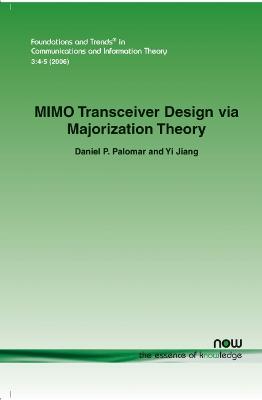Foundations and Trends (R) in Communications and Information Theory
1 total work
MIMO Transceiver Design via Majorization Theory
by Daniel P. Palomar and Yi Jiang
Published 1 January 2007
Multiple-input multiple-output (MIMO) channels provide an abstract and unified representation of different physical communication systems, ranging from multi-antenna wireless channels to wireless digital subscriber line (DSL) systems. They have the key property that several data streams can be simultaneously established.
MIMO Transceiver Design via Majorization Theory presents an up-to-date unified mathematical framework for the design of point-to-point MIMO transceivers with channel state information (CSI) at both sides of the link according to an arbitrary cost function as a measure of the system performance. In addition, the framework embraces the design of systems with given individual performance on the data streams.
This is an invaluable resource for researchers and practitioners involved in the state-of-the-art design of MIMO-based communication systems.
MIMO Transceiver Design via Majorization Theory presents an up-to-date unified mathematical framework for the design of point-to-point MIMO transceivers with channel state information (CSI) at both sides of the link according to an arbitrary cost function as a measure of the system performance. In addition, the framework embraces the design of systems with given individual performance on the data streams.
This is an invaluable resource for researchers and practitioners involved in the state-of-the-art design of MIMO-based communication systems.
